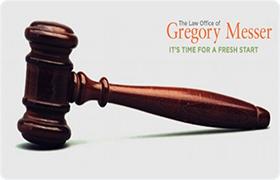 Flushing Collection Lawyers, New York
Flushing Collection Lawyers, New York
Sponsored Law Firm
-
 x
x

Click For More Info:
-
Law Offices of Gregory Messer
26 Court Street Suite 2400 Brooklyn, NY 11242» view mapBankruptcy & Debt It's Time For A Fresh Start
Experienced bankruptcy attorney Gregory Messer will work with you personally to set your mind at ease and relieve the strain you’re facing from personal or business debt.
800-887-8940
Lawyers
1-10 of 22 matches
Business Organization, Collection, Banking & Finance, Bad Faith Insurance
Dispute Resolution, Franchising, Business Organization, Collection
Patent, Mental Health, Licensing, Collection
Collection, Arbitration, Construction Liens, Tax, Complex Litigation
Collection, Securities Regulation, Child Custody, Employee Rights, Military & Veterans Appeals
Collection, Child Custody, Family Law, Child Support



 Gregory Messer Brooklyn, NY
Gregory Messer Brooklyn, NY Practice AreasExpertise
Practice AreasExpertise